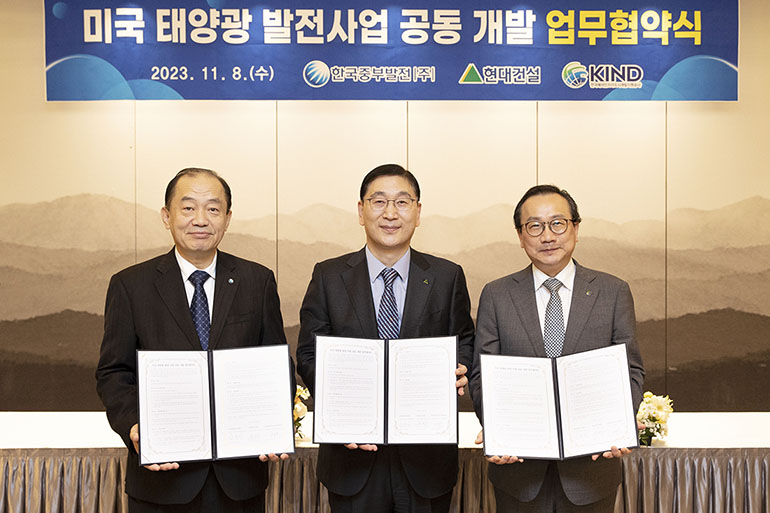
Latest News
- Hyundai E&C Accelerates Global Nuclear Expansion into the U.S. Nuclear Market
- Hyundai E&C Shifts into High Gear to Enter Nordic Large-Scale Nuclear Market
- Hyundai E&C Strengthens Korea-Japan Cooperation in Energy Transition and New Growth Businesses
- Hyundai E&C Signals Green Light for Large-Scale Nuclear Power Plant Business in Europe
- Hyundai E&C Unveils Energy-driven Growth Strategy “H-Road”
Hyundai E&C-Korea Midland Power (KOMIPO)-KIND, Formed a private-public partnership to jointly enter the US solar power project

[Picture of MOU signing of Hyundai E&C-KOMIPO-KIND. President Yoon Young-joon of Hyundai E&C (Middle), President Kim Hobin of KOMIPO (Left), and President Lee Kang-hoon of KIND (Right) are taking a group photo after signing the MOU on the cooperation for the joint development of US solar power projects on November 8th at Ambassador Seoul Pullman Hotel]
Hyundai E&C, Korea Midland Power (KOMIPO) and Korean Overseas Infrastructure & Urban Development Corporation (hereinafter ‘KIND’) is entering into joint development for solar power projects in US in earnest. On 8th (Wed), Hyundai E&C, KOMIPO and KIND singed a strategic business memorandum of understanding (MOU) on ‘Joint Development of Solar Power Projects in US’ at the Ambassador Seoul Pullman Hotel located in Jangchung-dong, Jung-gu of Seoul. Key management personnel from each company including President Yoon Young-joon of Hyundai E&C, President Kim Hobin of KOMIPO, and President Lee Kang-hoon of KIND participated in the MOU signing ceremony. Through this agreement, each company will ▲ develop, construct and operate the US solar power and relevant power projects, ▲ seek plans to secure feasibility and improve business profitability and ▲ cooperate closely to jointly enter the US power projects by exchanging information for joint collaboration in projects.
Among new power facilities in US, solar power projects account for 46% (as of 2022), which is higher than 15% that was recorded 10 years ago. Solar power capacity that is currently in operation in US as of the first half of this year is 153GW in total, and the market is forecasting* this number to expand to 375GW by 2028 and to 1570GW by 2050, which is approximately 10 times greater than the current number. Against this backdrop, three companies will establish a private-public partnership to expand entrance into the US solar power projects through this agreement and will maximize synergy among public institutions, public companies and private companies to focus capabilities on all areas of the project spanning from development stage to construction and operation.
*Cited from the “US Solar Market Insight Q3 2023” report published by the Solar Energy Industries Association and Wood Mackenzie and “US Solar Policy Market, Our Opportunities and Challenges” report published by the Korea Trade-Investment Promotion Agency (KOTRA).
Hyundai E&C will focus on the role of EPC (design, construction and procurement) and development of solar power plant based on the its global network and world-class construction capability that it accumulated for a long period of time, KOMIPO will focus on providing a stable supply of high quality power based on its knowhow on operating numerous power projects at home and abroad, and KIND will focus on conducting feasibility study and providing funding to discover projects based on its financial expertise and collaborative relationships with major relevant institutions.
Hyundai E&C and KIND are cooperating to develop a 459MW solar power plant in Concho County located in the central part of Texas, US, and KOMIPO is developing and operating the Concho Valley Solar PV Project (160MW) and Elara Solar PV Project (130MW) in US. The partnership entered into by three companies is expected to contribute greatly to the achievement of global RE100 through generation of renewable energy power in addition to the improvement in competitiveness to win orders for the renewable energy power projects in US.
Relevant personnel of Hyundai E&C said, “Hyundai E&C is actively participating in demonstration and development of technology for energy such as hydrogen, offshore wind power, small modular reactor (SMR) and CCUS in addition to solar power to preemptively counter climate change,” and added, “We are planning to expand the scope of ESG management and lead the carbon neutrality ecosystem by establishing plans to secure growth drivers for the future such as projects to develop a leading market for renewable energy”.

